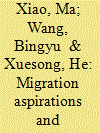| Srl | Item |
| 1 |
ID:
187511


|
|
|
|
|
| Summary/Abstract |
This paper explores the temporal dimensions in and consequences of migration from the perspective of how they are involved in both promoting and undermining cosmopolitan attitudes and practices amongst mobile subjects. Drawing on qualitative research with new Chinese migrants to New Zealand, the paper explores how their process of becoming cosmopolitan to participate in intercultural interactions is constructed differently in relation to momentary, everyday, remembered and imagined times/temporalities embedded in their lives. In particular, the paper asks whether and how migrant individuals navigate through temporal dissonance occurred across the migratory process by engaging in or retreating from cosmopolitanism. Essentially, this paper develops a temporally-sensitive theoretical approach to unpack how time and temporalities function in the migration process, especially how they articulate with the possibilities of migrant individuals encountering diversity and obtaining a sense of home in the host society, thus contributing to studies of cosmopolitanism and time in migration.
|
|
|
|
|
|
|
|
|
|
|
|
|
|
|
|
| 2 |
ID:
190921


|
|
|
|
|
| Summary/Abstract |
Drawing on longitudinal research with 33 Chinese international students in 10 European countries, this article examines their polymorphic identifications towards homeland and asks how these changing perceptions constitute the underlying logic of their particular migration aspirations during the COVID-19. Specifically, the article explores how homeland identifications function as a driving force to facilitate ‘voluntary immobility’ in the study destination while being used as a tackling strategy to adapt to their ‘involuntary immobility’ overseas. It also examines how these identifications articulate with the students’ mixing and shifting migration aspirations formulated during the pandemic. In doing so, the article demonstrates that polymorphic perceptions closely relate to the generation, exercise and reproduction of their migration aspirations that are temporally distributed.
|
|
|
|
|
|
|
|
|
|
|
|
|
|
|
|